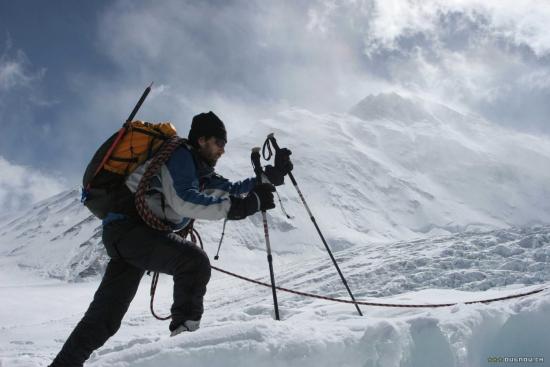

Reviews of Recent Independent, Foreign, & Documentary Films in Theaters and DVD/Home Video
Directed by Lucy Walker Produced by Sybil Robson Orr Directory of photography, Petr Cikhart Edited by Sebastian Duthy Music by Nitin Sawhney Released by Robson Entertainment Language: English, German, Tibetan with English subtitles UK. 104 min. Rated PG Tashi was 10 years old and already blind when he was sold by his parents and taken from his remote Chinese village to beg on the streets of Tibet. Ridiculed by the locals, who view blindness as a marker of sin, and tortured by his captors, Tashi ran away to continue life in the dark and on his own. Then, one day, a beautiful blind German woman rode in on a horse and whisked him away to live and study in her groundbreaking school: Braille Without Borders. Flash forward a few years: the frail, nervous Tashi, who now speaks a bit of English, is gearing up to climb Lhakpa Ri, a 23,000-foot mountain peak in the shadow of Mount Everest. For a documentary filmmaker, his story is Shangri-La. Tashi was only one of many children saved by Sabriye Tenberken, and one of six teenagers who went on the death-defying expedition, which forms the narrative framework for Blindsight. After hearing that Erik Weihenmayer, a blind, widely respected athlete, climbed Mount Everest, Tenberken invited him and a troupe of professional mountain guides to take her students on a climb of their own. The idea was to inspire confidence in a group of kids who were shunned and disregarded, often by their own parents, and hope that the “yes you can” message would resound all around the world. This was undoubtedly the story Lucy Walker, the director, intended to tell. But when the swaggering guides arrive with their high-tech equipment and talk turns from the inspirational to strategies for survival, the purpose of the journey becomes increasingly murky. Was it really necessary to expose these youth to potential altitude sickness, injury, or death – all in the name of symbolism? As they climbed higher and higher along the path (illustrated with gripping video-game graphics), the answer to this question, rather than the outcome of the expedition, becomes the film’s greatest source of suspense.
Because the climbing team was often just one misstep away from dealing with matters of life and death, their fiery personalities were mostly left
unguarded. This serves as an interesting contrast to the coordinated stunt and a welcomed nuance in the film. Equally fascinating is the
insider profile of exotic Tibet provided by a peek of each child’s family. The result – a film that captures far more than your run-of-the-mill
triumph over adversity. Yana Litovsky
|